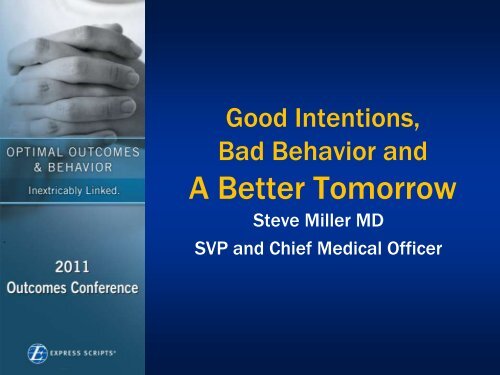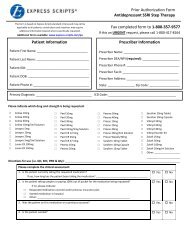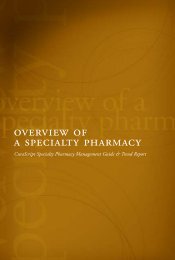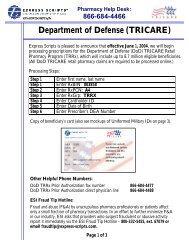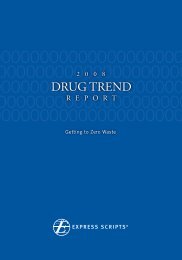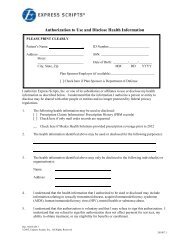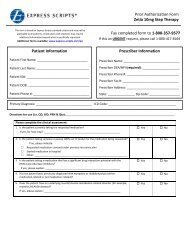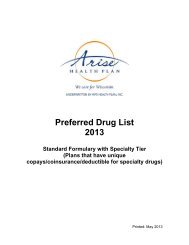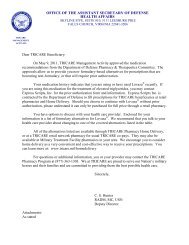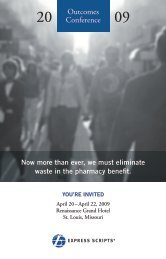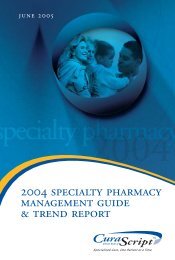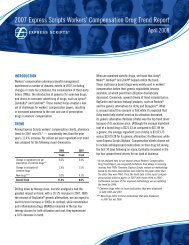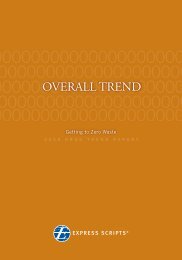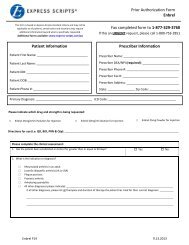slides - Express Scripts
slides - Express Scripts
slides - Express Scripts
You also want an ePaper? Increase the reach of your titles
YUMPU automatically turns print PDFs into web optimized ePapers that Google loves.
Good Intentions,<br />
Bad Behavior and<br />
A Better Tomorrow<br />
Steve Miller MD<br />
SVP and Chief Medical Officer
What a Year 2010 Was!<br />
Healthcare Reform Passes<br />
Election Implementation Results Begins<br />
Watson Republican Beats majorities Humans<br />
in Carbon-based the House and life-forms in<br />
Charlie Sheen<br />
many shown more to be states<br />
Any questions? inferior at<br />
Jeopardy!<br />
Outcomes Conference 2011<br />
2
“The good physician<br />
treats the disease;<br />
the great physician<br />
treats the patient.”<br />
Sir William Osler<br />
Founding Professor of Medicine<br />
Johns Hopkins Hospital<br />
1849 - 1919<br />
Outcomes Conference 2011<br />
3
Medical Training Before Dr. Osler<br />
•Classrooms were<br />
amphitheaters<br />
•Students had no contact with<br />
patients<br />
•Physicians met their first<br />
patients only after graduating<br />
from medical school<br />
Outcomes Conference 2011<br />
4
Dr. Osler Introduced Bedside Instruction<br />
Outcomes Conference 2011<br />
5
Dr. Osler Introduced Medical Internships<br />
Outcomes Conference 2011<br />
6
We Are Still Learning from Dr. Osler<br />
“It is much more important<br />
to know what sort of<br />
a patient has a disease<br />
than what sort of<br />
a disease a patient has.”<br />
Forgetting Dr. Osler’s lessons<br />
has driven an<br />
explosion in waste.<br />
Outcomes Conference 2011<br />
7
$400<br />
$403 Billion Wasted in 2010<br />
$350<br />
$300<br />
$250<br />
HD Adherence<br />
$200<br />
$150<br />
$100<br />
$50<br />
$0<br />
HD Mix<br />
Safer<br />
Dispensing<br />
Adherence<br />
Mix<br />
Mix Channel Adherence<br />
Outcomes Conference 2011<br />
8
25%<br />
2010 Overall Drug Trend: 3.6%<br />
20%<br />
15%<br />
10%<br />
Overall<br />
•3.6%<br />
Traditional<br />
•1.4%<br />
Specialty<br />
•19.6%<br />
5%<br />
0%<br />
2006 2007 2008 2009 2010<br />
Overall Drug Trend<br />
Traditional Drug Trend<br />
Specialty Drug Trend<br />
Outcomes Conference 2011<br />
9
Monthly Copay<br />
Member Cost-Share Continues to Fall<br />
$60<br />
25%<br />
$50<br />
$40<br />
$30<br />
$20<br />
$10<br />
22.5% 22.0%<br />
20.2% $54.19<br />
19.3%<br />
$47.76<br />
Overall copays fell by $0.32 per Rx<br />
to a new low member share of<br />
19.3%<br />
$12.47 $12.15 $12.33 $11.98 2.6% 2.6%<br />
20%<br />
15%<br />
10%<br />
5%<br />
Fraction of total Rx cost<br />
$0<br />
Overall Traditional Specialty<br />
2009 2010<br />
Outcomes Conference 2011<br />
0%<br />
10
Drug cost inflation rate<br />
Brand Inflation Climbed to 9.7%<br />
10%<br />
8%<br />
6%<br />
7.6%<br />
Brands<br />
9.7%<br />
0%<br />
-2%<br />
-4%<br />
Generics<br />
-6%<br />
4%<br />
2%<br />
-8%<br />
-10%<br />
-9.0%<br />
-10.2%<br />
0%<br />
-12%<br />
2008 2010 2008 2010<br />
Outcomes Conference 2011<br />
11
Your Decisions Drive<br />
Your Members’ Behaviors<br />
Market and Behavioral Analysis<br />
Market Factors<br />
Prevalence<br />
Cost per prescription<br />
Units per prescription<br />
Patent expirations<br />
New drug entrants<br />
Behavioral Factors<br />
Drug mix<br />
Channel<br />
Therapy adherence<br />
Total Behavioral<br />
Savings Opportunity<br />
Outcomes Conference 2011<br />
12
2010 Overall Drug Trend: 3.6%<br />
Prevalence<br />
0.3%<br />
Drug Cost<br />
4.2%<br />
Units per Rx<br />
0.0%<br />
Patent Expirations<br />
-1.7%<br />
New Drugs<br />
Adherence<br />
0.3%<br />
1.7%<br />
Drug Mix<br />
-1.1%<br />
-2% 0% 2% 4% 6%<br />
Outcomes Conference 2011<br />
13
2010 Overall Drug Trend: 3.6%<br />
Prevalence<br />
0.3%<br />
Market<br />
Factors<br />
Drug Cost<br />
Units per Rx<br />
0.0%<br />
4.2%<br />
Patent Expirations<br />
-1.7%<br />
New Drugs<br />
0.3%<br />
Behavioral<br />
Factors<br />
Adherence<br />
Drug Mix<br />
-1.1%<br />
1.7%<br />
-2% 0% 2% 4% 6%<br />
Outcomes Conference 2011<br />
14
2010 Traditional Drug Trend: 1.4%<br />
Prevalence<br />
-0.7%<br />
Market<br />
Factors<br />
Drug Cost<br />
Units per Rx<br />
0.2%<br />
3.5%<br />
Patent Expirations<br />
-1.9%<br />
New Drugs<br />
0.2%<br />
Behavioral<br />
Factors<br />
Adherence<br />
Drug Mix<br />
-1.7%<br />
1.9%<br />
-2% -1% 0% 1% 2% 3% 4%<br />
Outcomes Conference 2011<br />
15
Obesity Is Now the Norm<br />
Ages 2 - 19<br />
Adults<br />
34%<br />
68%<br />
66%<br />
32%<br />
Normal<br />
http://www.cdc.gov/nchs/fastats/overwt.htm. Accessed March 18, 2011.<br />
Overweight/Obese<br />
Outcomes Conference 2011<br />
16
Obesity and Diabetes Maps Match<br />
Obesity by County, 2007<br />
Behavior Is Key<br />
Diabetes by County, 2007<br />
www.cdc.gov/obesity/data/trends.html. Accessed March 16, 2011.<br />
Outcomes Conference 2011<br />
17
Top Three Traditional Classes<br />
Each Is Linked to Obesity<br />
15%<br />
High Cholesterol<br />
6.3% Trend<br />
Diabetes<br />
12.5% Trend<br />
Cardiovascular<br />
-0.4% Trend<br />
10%<br />
5%<br />
0%<br />
-5%<br />
--10%<br />
Class Trend Market Factors Behavioral Factors<br />
Outcomes Conference 2011
0%<br />
-2%<br />
-4%<br />
Two Other Classes to Watch<br />
Ulcer Disease<br />
Attention Disorders<br />
25%<br />
20%<br />
15%<br />
-6%<br />
-8%<br />
-14%<br />
10%<br />
5%<br />
17%<br />
-10%<br />
0%<br />
-12%<br />
-5%<br />
-14%<br />
-10%<br />
Class Trend Market Factors Behavioral Factors<br />
Outcomes Conference 2011<br />
19
2010 Specialty Drug Trend: 19.6%<br />
Prevalence<br />
7.0%<br />
Market<br />
Factors<br />
Drug Cost<br />
Units per Rx<br />
-0.8%<br />
9.2%<br />
Patent Expirations<br />
-0.1%<br />
New Drugs<br />
1.1%<br />
Behavioral<br />
Factors<br />
Adherence<br />
Drug Mix<br />
0.0%<br />
3.3%<br />
-2% 0% 2% 4% 6% 8% 10%<br />
Outcomes Conference 2011<br />
20
Top Three Specialty Classes<br />
30%<br />
Inflammatory<br />
23.5% Trend<br />
Multiple Sclerosis<br />
25.4% Trend<br />
Cancer<br />
23.7% Trend<br />
25%<br />
20%<br />
15%<br />
10%<br />
5%<br />
0%<br />
-5%<br />
Class Trend Market Factors Behavioral Factors<br />
Outcomes Conference 2011
PMPY<br />
Specialty Is More than the<br />
Top Four Traditional Classes Combined<br />
$350<br />
$300<br />
$250<br />
$200<br />
$150<br />
High<br />
Cholesterol<br />
Diabetes<br />
Medical<br />
Benefit<br />
$100<br />
$50<br />
$0<br />
Cardiovascular<br />
Depression<br />
Traditional<br />
Pharmacy<br />
Benefit<br />
Specialty<br />
Outcomes Conference 2011<br />
22
400%<br />
Medical Benefit Is<br />
Growing Out of Control<br />
300%<br />
200%<br />
100%<br />
0%<br />
-100%<br />
Inflammatory<br />
Conditions<br />
Multiple<br />
Sclerosis<br />
Cancer<br />
Pulmonary<br />
HTN<br />
Blood Cell<br />
Deficiency<br />
Pharmacy Benefit<br />
Medical Benefit<br />
ESI DTR 2010: Division of medically billed specialty drug spend by site of<br />
care. Thomson Reuters MarketScan ® Commercial Database, 2005-2008.<br />
Outcomes Conference 2011<br />
23
100%<br />
Specialty Pharmacy Is<br />
Leaving Physicians’ Offices<br />
80%<br />
60%<br />
76% 74%<br />
70%<br />
63%<br />
All Other:<br />
•Emergency Rooms<br />
•Urgent Care Centers<br />
40%<br />
•Inpatient Sites<br />
20%<br />
•Outpatient Facilities<br />
0%<br />
2005 2006 2007 2008<br />
Physicians' Offices<br />
All Other<br />
ESI DTR 2010: Division of medically billed specialty drug spend by site of care.<br />
Thomson Reuters MarketScan ® Commercial Database, 2005-2008.<br />
Outcomes Conference 2011<br />
24
Physician Strategies<br />
Are Vital to Success in Specialty<br />
Outcomes Conference 2011<br />
25
Big Challenges, Big Solutions<br />
Specialty<br />
Pharmacy Benefit<br />
Management<br />
<strong>Express</strong> <strong>Scripts</strong><br />
Medical Benefit<br />
Management<br />
Care Continuum<br />
Specialty<br />
Pharmacy and<br />
Distribution<br />
CuraScript<br />
Outcomes Conference 2011<br />
26
Harness Patients’ Good Intentions…<br />
…and cut 33%<br />
of America’s pharmacy-related waste<br />
Outcomes Conference 2011<br />
27
We Commissioned Harris Interactive<br />
Nationally recognized firm specialized in<br />
assessing consumer attitudes and beliefs<br />
• Representative sample of American adults<br />
• N = 2,099<br />
• Current users of daily prescription medications<br />
• Provided realistic scenarios of various Rx-related<br />
choices (e.g., Home Delivery vs. Retail)<br />
Outcomes Conference 2011<br />
Source: Harris Interactive & <strong>Express</strong> <strong>Scripts</strong>, 2011
If Consumers are Satisfied with<br />
Current Behavior…<br />
~0%<br />
~0%<br />
~0%<br />
of people taking brand-name meds would<br />
rather be taking generics<br />
of people getting maintenance meds in retail<br />
would rather be in Home Delivery<br />
of people going to more expensive retail<br />
stores would switch to lower-cost retail stores<br />
Outcomes Conference 2011
But Harris Interactive<br />
Found That…<br />
~0% 82%<br />
~0% 70%<br />
~0% 40%<br />
of people taking brand-name meds would<br />
rather be taking generics<br />
of people getting maintenance meds in retail<br />
would rather be in Home Delivery<br />
of people going to more expensive retail<br />
stores would switch to lower-cost retail stores<br />
Outcomes Conference 2011
Dr. Osler Would Be Proud<br />
Treat the patient, not the disease.<br />
• Treating diseases, Challenges not patients, lie ahead. has created a<br />
huge amount of waste.<br />
• While Specialty total trend requires is controlled, a holistic challenges approach. lie<br />
ahead.<br />
• Treat the entire<br />
Activate<br />
spectrum<br />
intent.<br />
of the specialty<br />
patient, not just the disease.<br />
• Understanding how to activate intent is crucial to<br />
healthcare success moving forward.<br />
Outcomes Conference 2011<br />
31


